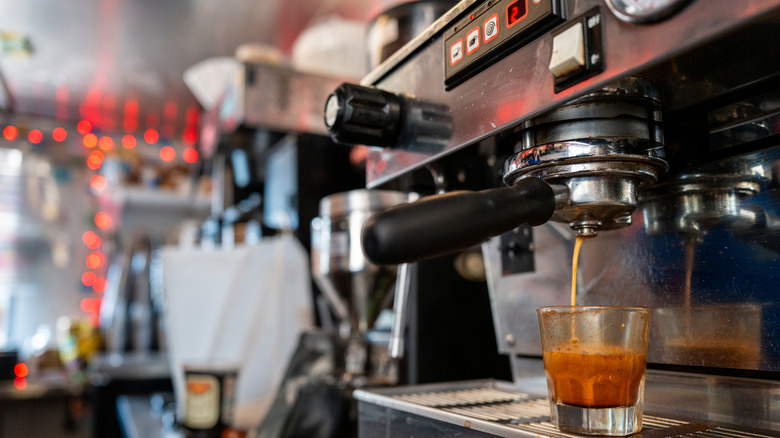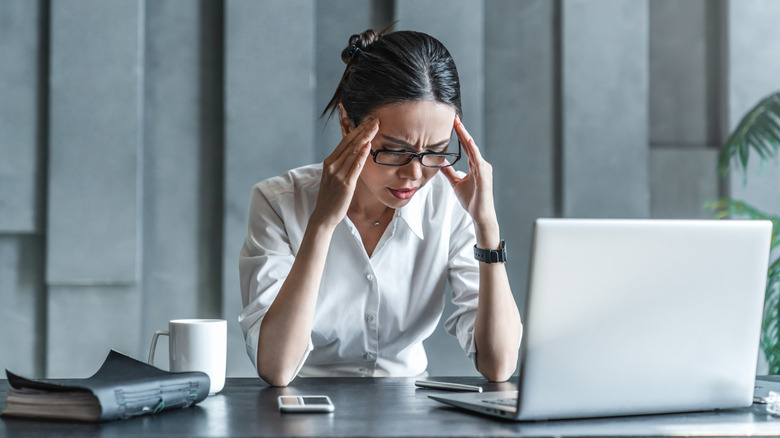How Many Espresso Shots Is Too Many In One Day?
Coffee culture is strong in the United States, encompassing a range of options from iced coffees to frappés, cappuccinos, and espressos. You usually get most coffee drinks in a pretty decent-sized cup (around 8 ounces), whether you get it from a shop or make it at home in your favorite beginner-friendly machine. The espresso is different, though, as a standard serving of this drink is roughly one ounce, which lets you know that the espresso might be small, but it's mighty.
A single shot of espresso contains around 29 to 100 milligrams of caffeine (75mg is the average), depending on the bean, roast, and brewing method. That means if you're sipping on a double shot, you're consuming roughly 60 to 150 mg of caffeine in one go. According to the FDA, the recommended safe limit for daily caffeine intake is 400 milligrams for healthy adults. That puts the cap at about five or six espresso shots per day, and that's only if you're not getting caffeine from any other source.
The tricky part here is that caffeine tolerance isn't a one-size-fits-all number. Some people are more sensitive due to genetics, body size, or other health conditions, and you want to keep that in mind when you're trying to figure out the magic number for yourself. Drinking more than your body can handle could lead to symptoms like insomnia, anxiety, jitters, increased heart rate, and even digestive issues. On the flip side, others may build up tolerance over time, meaning they need more caffeine to feel the same boost, but that also increases dependency. So, how much caffeine is okay? Listen to your body and give your real-life experience priority over the math — even if you're technically under the limit.
How caffeine affects your body (And why it varies so much)
Caffeine stimulates your central nervous system, and espresso delivers it fast because it's highly concentrated. Once you drink it, caffeine blocks adenosine, which is the brain chemical responsible for making you feel sleepy. This results in heightened alertness and sometimes an improved sense of focus or mood, which is why people reach for espresso to power through mornings or to get through the midday slump when things are dragging. Here's how caffeine affects you depending on several varying factors.
Your genetics play a big role, and some people metabolize caffeine quickly, while others are slow metabolizers. That's why two people can drink the same number of espresso shots and have totally different reactions — one feels fine, while the other is battling heart palpitations. Your age, medications, liver function, and even hormonal cycles can change how long caffeine stays in your body. Typically, caffeine has a half-life of 3 to 7 hours (with an average of 5 hours), but for some individuals, it can linger even longer.
It's also worth noting that since caffeine affects sleep quality, consider the fact that your caffeine window might be too wide if you're still struggling to sleep at night. Even drinking it a few hours before bedtime might be cutting it too close. Keeping your last shot before 2 or 3 p.m. is a good rule of thumb for most people.
Tips to enjoy espresso without going overboard
If you love espresso but don't want to overdo it, a few smart habits can keep your daily intake balanced. First, spread your shots out; instead of drinking two or three all at once, try spacing them throughout the day. This reduces the risk of a caffeine crash and helps avoid the shaky, anxious feeling that sometimes comes from one big jolt.
Also, track all your caffeine sources, and not just the espressos. If you're drinking tea, soda, or your favorite energy drink as well, your total caffeine intake can sneak up fast. Even some medications and supplements contain hidden caffeine, so be sure to check those as well. Try to stay under 400 mg per day, or even less if you're sensitive.
It's also a good idea to take occasional breaks from caffeine. If you find yourself needing multiple shots just to feel normal, you might be building a tolerance and an unhealthy dependence. Cutting back gradually for a few days can help reset your baseline, and you can also explore decaf or half-caf espresso blends for your second or third coffee of the day. Espresso should be enjoyable — not something that causes crashes, anxiety, or restless nights.


